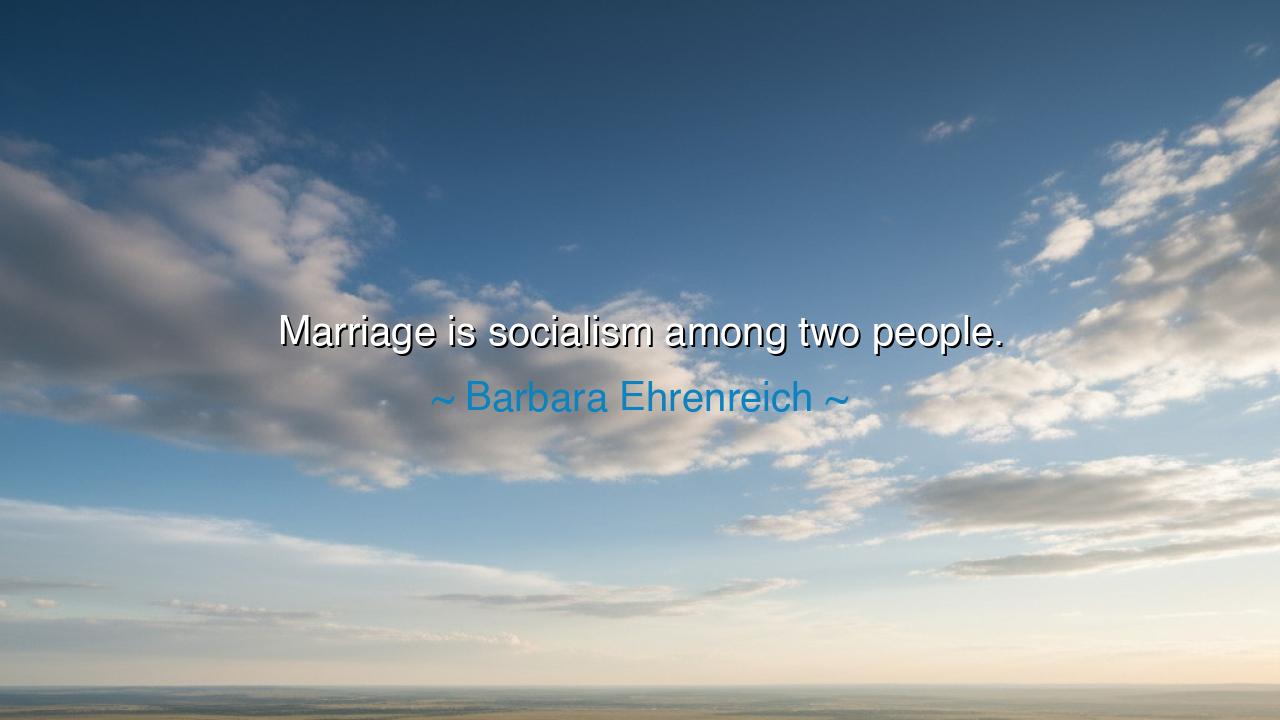
Marriage is socialism among two people.






When Barbara Ehrenreich declared, “Marriage is socialism among two people,” she clothed a familiar union in the language of politics and justice, revealing a truth often hidden in plain sight. Her words do not speak of parties or governments, but of the intimate economy of the household, where two souls merge not only in affection but in labor, resources, and care. In this vision, marriage is not merely romance—it is a compact of mutual provision, a sharing of wealth, burdens, and dreams. It is a form of socialism, not writ large across nations, but lived daily between two human beings who vow to give not according to self-interest, but according to love.
The meaning of this quote is rich in paradox. In the world beyond the home, society often praises competition, individual advancement, and private gain. Yet in the realm of marriage, these values cannot endure. One partner cannot hoard wealth while the other starves, nor can one claim power while the other is silenced, without destroying the bond itself. Instead, the survival of the union demands sharing, the pooling of resources, the division of labor, and the recognition that what is mine is also yours. In this way, Ehrenreich captures the truth: marriage is a microcosm of equality, where selfishness yields to cooperation, and where survival depends not on dominance but on solidarity.
The origin of her words lies in her lifelong work as a thinker and critic of social inequality. Barbara Ehrenreich, famed for her sharp wit and piercing analysis of labor, poverty, and power, turned her gaze to the private realm, where the personal becomes political. In describing marriage as socialism, she stripped away sentimentality to reveal its material reality: a shared household is built on shared resources, shared responsibilities, and shared sacrifices. What societies struggle to build among millions, couples often practice instinctively within their homes.
History gives us many illustrations of this truth. Consider the lives of pioneer families in the American frontier. Isolated on vast, unforgiving landscapes, survival required that husband and wife work together as equals, each laboring for the good of both. The man might plow the field, the woman might tend the home, but their survival was collective. If either claimed dominion or withheld labor, the household would collapse. Their marriage was not merely romantic—it was practical socialism, a covenant of shared struggle and shared provision in the face of hardship.
The wisdom of Ehrenreich’s words is that they remind us marriage is not only an emotional union but also an economic one. Love alone may ignite the flame, but it is the sharing of daily burdens—the bills, the children, the cooking, the sorrows—that keeps the flame alive. When one partner sacrifices for the other, when both give freely of what they have, they create not a hierarchy but a partnership of equals. This is socialism among two people—a socialism not of ideology, but of lived necessity, where generosity replaces greed and cooperation defeats selfishness.
The lesson is clear: those who enter marriage must see it not only as a bond of passion but as a covenant of sharing. Do not cling to the language of “mine” and “yours,” but learn to speak the language of “ours.” Remember that success in marriage is not measured by who gives less and who gains more, but by how both sustain each other in times of need. Just as nations require justice to endure, so too do marriages require equality and fairness to thrive.
What then must the listener do? In your own unions, whether marriage or partnership, embrace the spirit of sharing. Divide labor not by tradition alone, but by fairness. Support one another’s dreams as if they were your own, and face one another’s struggles as if they belonged to both. Live not as two rivals in the same house, but as two allies building the same future. In this way, your union becomes more than survival—it becomes a sanctuary of justice and compassion.
Remember always: marriage is socialism among two people. It is the daily practice of equality, the quiet revolution of love that defies selfishness. Let this truth guide you, for in a world divided by greed, every home that lives by sharing becomes a small beacon of hope, a living example of what humanity might yet achieve.






AAdministratorAdministrator
Welcome, honored guests. Please leave a comment, we will respond soon